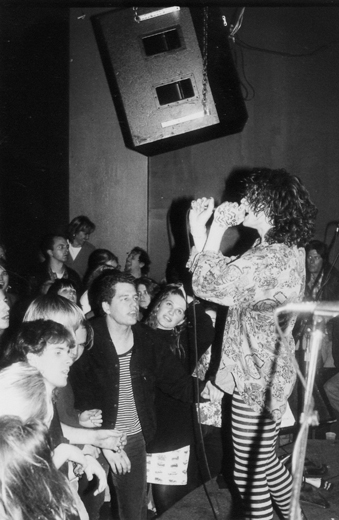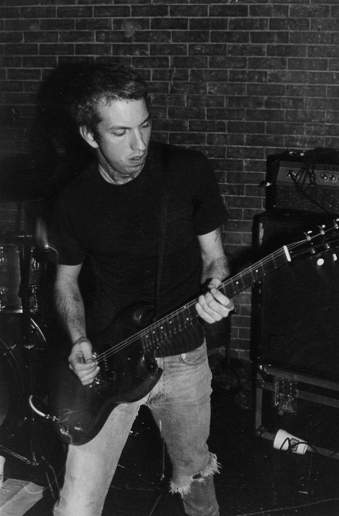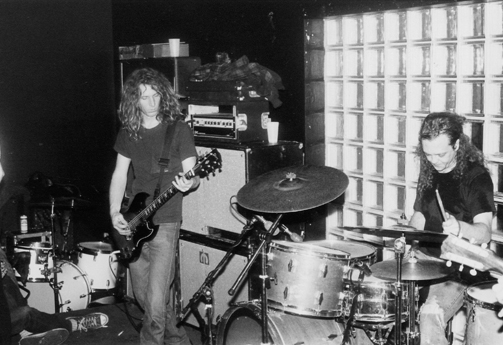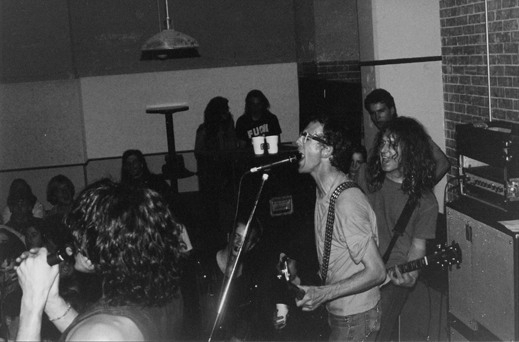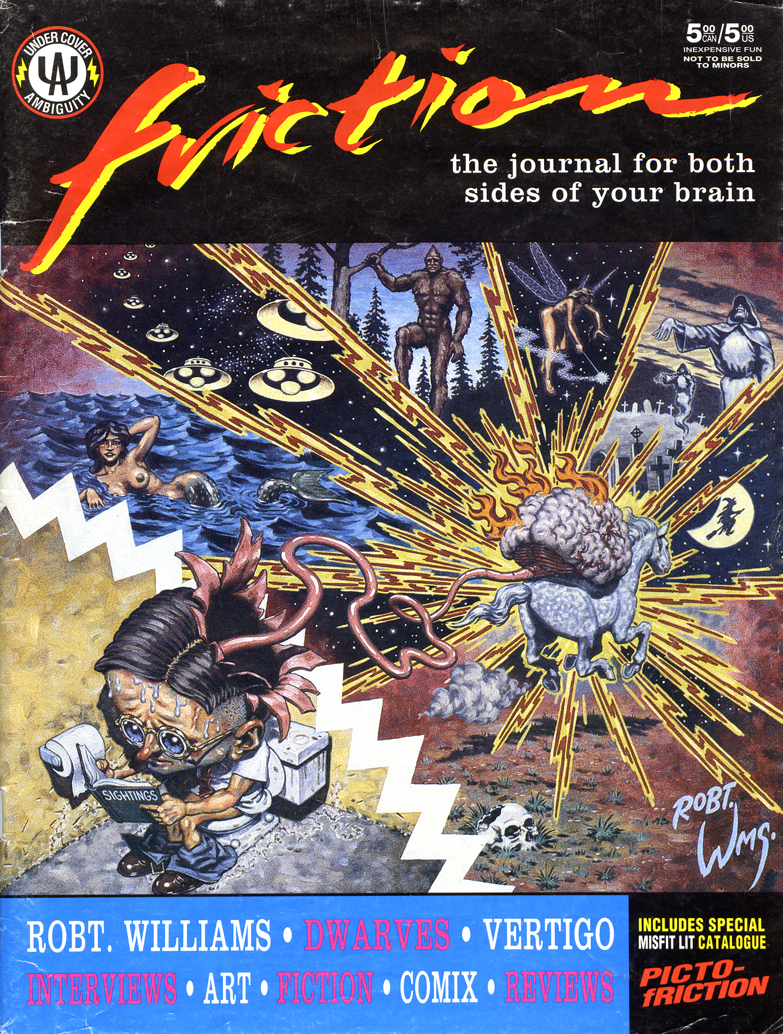
The Fluid
Interview
Originally printed in Friction Vol. 2, No. 2 – 1992

On a sub-freezing November night in Denver, local faves The Fluid are preparing
to open up a show with Sonic Youth at the Gothic Theatre. Chris McLallen, Chris
Irvin and I travel next door to the China House Chow Mein & Egg Roll restaurant
with The Fluid vocalist John Robinson to chat about the current state of events.
Other band members (James Clower – guitars, Rick Kulwicki – guitars, Matt
Bischoff – bass, Garrett Shavlik – drums) enjoy some fine southwestern cuisine
as we interviewed John for Friction. During the passage of the interview, the
show sold out beyond the 800 persons capacity, leaving a few people outside and
fairly miffed.
MJ: So what is it about Denver that’s persuaded The Fluid to stick around?
JR: By this point we’re all pretty much rooted here. I’m not from here but now
I’ve gotten comfortable here. You know, it’s one thing about Denver, it’s always
reliable. It’s boring, it sucks, but it’s not going to change. You can count on
that. We get our fill of happening scenes when we’re on tour, and we come back
here and it’s mellow, just hang out at home. It’s become a comfortable place to
be. When we get back here, none of us go out and do anything anyway. We’re
traveling so much that the best thing about being in Denver is sitting and
watching the TV or something like that. When we travel around and people ask us
what the Denver scene is like, we’re like, “We don’t know.” We can talk about a
couple of bands that are up and coming, but other than that none of us really
get out here. So, it’s stable. I guess that’s the best answer.
MJ: Where did the recent “Glue” tour take you and what are some of the most
receptive areas you’ve played?
JR: Touring has gotten to be more and more every year. This year it’s been about
six months of touring. We’re done for the year. It’s no fun to tour during the
winter. We just got back two days ago. Our last show was in Lawrence, Kansas. It
was a pretty long tour. We started in Seattle, zig-zagged across the southwest
and then four shows in Texas. From Texas up to New York, upper Midwest into
Canada, then back home. A lot of miles. It seems like each time we go out we can
add a new city onto the best reception list. Atlanta has become really good.
Minneapolis is always fun although they’re a little laid back there. Chicago has
become really good; San Francisco has become really good, so each time it seems
to get better in a certain place. It’s come to be that we’re pretty popular out
on the road. We’ve been touring a lot and the records have done pretty well.
We’ve been getting crowds in several cities as big as we do in Denver. It’s rare
that we do opening slots, and when we do we’re just playing with them. You know,
we project a real happy, positive thing. We play happy music. It makes us happy
to play it, out fans know the way we feel about it, they hopefully can pick up
on the same groove. But when we’re opening for somebody, there’s somebody else’s
crowd there, they don’t necessarily understand or appreciate it. But it’s been
pretty neat. The only state in the continental United States I haven’t been in
is Maine. We’ve seen a lot. We haven’t played in all those states but at least
we’ve gone through and seen them. Stopped for gas or something. On top of that
we’ve been to England, Scotland, Germany, Switzerland, Austria, Holland, all as
a result of the band.
MJ: I wanted to ask about the big deal with the different album covers that
you had on Glitterhouse over in Germany?
JR: The “Clear Black Paper” album came out first on Glitterhouse with that
cover. That was what we decided would be the cover of the record. And then for
the Sub Pop edition we just wanted to switch the photos. But Sub Pop wanted to
save money so they didn’t run the cover photo on the back of theirs, they just
ran the back photo of the Glitterhouse session on the cover.
MJ: What are some memorable show occurrences?
JR: Well…the ones that are coming to mind are shows that I would rather forget.
The ones in the forefront of my mind are shows that something bad happened. Like
a show at the Palladium, where we opened for Gwar and Rollins Band. It was a
really mixed crowd. The biggest crowd we’ve ever played for by far. There were
something like 3,500 people there. And before I really gauged the crowd, I made
the mistake of jumping off the stage into the crowd, and I just practically got
beat up. It turned out that there were a lot of skins there that were really
into Rollins’ trip and didn’t at all groove on what we were doing. They just
ripped my shirt to shreds and I got some pretty uncomfortable friction burns and
bruises out of the deal. That was a pretty bogus deal because after I finally
got back on stage I realized that there were lots of people that really hated us
there. They were just flipping us off and screaming, “You suck” and spitting all
over me and shit. So it was a pretty bad scene. It’s pretty memorable though.
Good warm welcome things happen a lot, it’s just that it’s gotten to be since we
are headlining a lot, it’s usually a really good feeling everywhere we go, so it
doesn’t stick out. The ones that stick out are the ones where something really
fucked up happened. I could turn it around though, our show in L.A. on our last
tour before this Gwar show, we were headlining there. And the place goes dark
and we walk on stage and there’s these cheers and it’s like, “Wow!” We haven’t
even played a note and they’re cheering and that’s a really good feeling.
MJ: I heard Gwar recently got arrested in the deep south on obscenity charges.
JR: I wouldn’t be surprised. Though they’re from the deep south. They’re just a
bunch of goofy guys. I appreciate what they do because no one else is doing it.
They really put a lot of time and energy into the creation of that stage show.
Musically, I don’t care for it. But they’re really entertaining to watch. They
actually script out the performance before the music is written. Write the songs
around the script for the show. It’s strange for a band but it apparently works
for them. I appreciate it and find it really entertaining to watch. It’s not fun
playing for them because they have such a production that they spend all day
there doing their soundcheck. It’s not at all enjoyable opening for that kind of
a production.
MJ: How about your musical influences? Are there any recent ones since the
release of like the first album?
JR: As far as recording goes we’ve gotten better at materializing what we’ve
always been trying to do. We haven’t really spent more money in the studio than
we have in the past. It happened to be we’re just a lot better at getting the
sound that we’ve always tried to get. The sound on “Glue” is what we would have
tried to get all along if we knew what we were doing. The fact is, when we went
to record “Punch N’ Judy” none of us had really a clue as to how to really get
the sound that we wanted. We just experimented and made a record out of
experimentation. There’s no current rock music that’s influenced us, really.
Since “Punch N’ Judy” we’ve all gotten into big band a lot. We listen to a lot
of big band and swing music. I can pretty safely say that’s been an influence
because they really wrote songs. They’re short, they’re structured, they
have really catchy melodies and those are givens for any big band song. It’s not
like we try to take pieces of those songs and put them in a block form or
anything, but I think somewhere in there all those melodies make us be more
melodic ourselves.
MJ: Every Fluid record has had consistently top-notch packaging, but never
any lyrics sheet. Is there any reason for this?
JR: There’s not a basic reason for it, you know, there are a couple of different
ones though. Like when I was a kid and I really got into a song and there wasn’t
a lyric sheet, I would really spend time with the song, and put it on a
cassette, and rewind and rewind and write it all down until I had it. You sort
of garnish your own meaning out of the song. And I would hope that there are
songs of ours that people like that much to do that. In a way, by giving them
lyrics you can sort of take that away. They’re not able to delve into it that
deeply because it’s all there in black and white. Plus like with The Stones for
example, sometimes I think Jagger is saying something and it means something to
me, then I find out what he’s really saying, 12 years later, and it’s really
interesting. But if you don’t have lyrics there in front of you, you can derive
your own meaning. When I write lyrics I try to think on a couple of different
levels. Sometimes it’s real basic rock song lyrics. Then if you kind of look
under the surface there’s little messages in there. I like to think that I have
things to say that could awaken people to a certain topic or situation. Then,
some of the lyrics have been things that I didn’t want to spell out in black and
white either. I didn’t think it was important. A lot of the songs will sound
angry or they’ll sound happy, and it seems natural to tailor the lyrics to what
emotion you get from the song.
MJ: What’s the status on your first two releases that are out of print?
JR: Chances are that the original mix of “Punch N’ Judy” is going to come out on
CD on Sub-Pop, with all of “Clear Black Paper” on the disc as well. I don’t know
if it will be re-released on vinyl anytime soon. But for the CD we’re going to
do the original mix and original order of songs.
